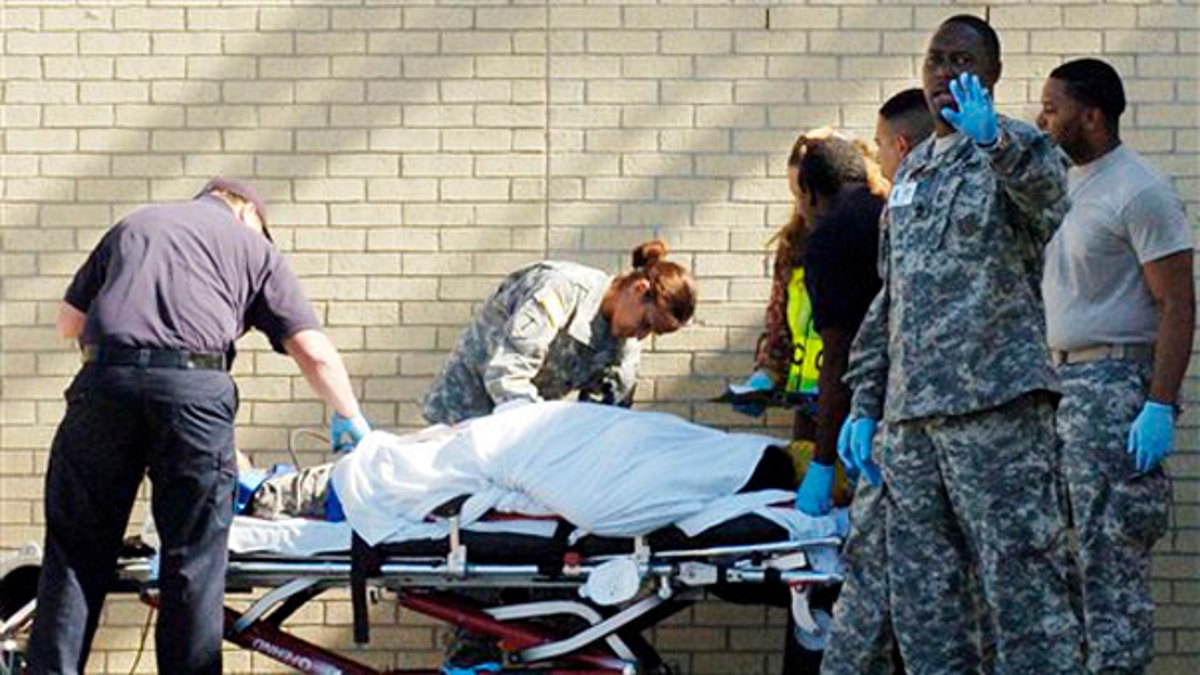
Thursday, Nov. 6, 2009: Emergency personnel transport an unidentified soldier from the Soldier Readiness Center following a shooting at Fort Hood, Texas. (AP)
It was one of the of the deadliest mass shootings on a U.S. base, but the shooting rampage at Fort Hood that killed 13 and wounded as many as 38 this week has sparked a debate about whether it was an act of terrorism.
The alleged gunman, Maj. Nidal Malik Hasan, a Palestinian-American and an Army psychiatrist, reportedly shouted "Allahu akbar! -- Arabic for "God is great!" when he opened fire. He was seriously wounded by police and is being treated in a military hospital.
The military has said he was scheduled to deploy to Afghanistan, and family members suggested he was trying to avoid serving overseas.
That doesn't add up to the prelude to a terrorist attack, said Carl Tobias, a professor of law at University of Richmond who analyzes terrorist investigations across the country.
"Terrorist attacks are undertaken by people who typically ... have some agenda they want to forward politically, and from what I see in the news, this is just a person acting individually because he doesn't want to deploy overseas," he said. "So I just don't see that angle."
But others disagreed.
"Clearly I think it was a terrorist act. Whether he was connected to another group or not or a formal group is question we'll find out over the next couple of days," said Michael Scheuer, the former head of the CIA's Bin Laden unit.
"But for years now, it's been very clear that two of the targets for Al Qaeda and other Islamic groups for recruitment were in the U.S. military and in the U.S. prison system," he said. "So this is not really much of anything new."
Walid Phares, an expert on terrorism and a senior fellow at the Foundation for Defense of Democracies, called the shooting "the largest single terror act in America since 9/11."
"What happened at Ft. Hood is not about being frustrated by America's foreign policy or exacting revenge for racial slurs. Nor is it about simply being a Muslim-American serving in the military or about being a member of any faith," he wrote in an opinion piece published in FoxNews.com's Fox Forum.
"The murders at Ft. Hood are about the radicalization of individuals by an extremist ideology -- jihadism -- which fuels acts of terror," he said. "The main question we should be asking is when did Hasan become radicalized and who indoctrinated him? Everything else will fall in place once we have these answers. Moreover, this would allow us to detect other potential terror acts that may be in the making."
The authorities have not ruled out terrorism in the shooting, but they said the preliminary evidence suggests that it wasn't.
Phares said he doesn't expect the shooting to be ruled an act of terrorism because he believes the Obama administration has made a political calculation to not fight a war on terror. He cited the administration's decision to substitute "Overseas Contingency Operation" for the "global war on terror."
"Had this occurred under the previous administration or any other previous administration, the natural position would have been America is under attack," he said. "It would have been a different posture. Now because a strategic decision has been made to disengage, our efforts will be suffering. They're not going to coin it as terrorism."
Scheuer said law enforcement officials have been loathe to rule the shooting an act of terrorism because "they're politically correct."
"Over the last 24 hours it appears this major was a very devout Muslim, and his pending deployment overseas put him in a position where he was going to be assisting in killing other Muslims," he said. "And that's a very big decision for a Muslim to do, not only killing another Muslim but killing on behalf of an infidel or a Christian."
But Tobias remained skeptical.
"To me, it looks more like the other shootings where one person seems mentally deranged," he said, adding that the rampage reminded him of the Virginia Tech shootings in 2007.












































